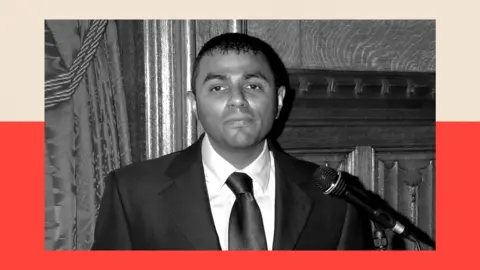 BBC
BBC“Outrageous!” “Ridiculous.” “They do not have a clue!”
Those are not descriptions of the prime minister’s behaviour that Labour would want to hear on any week – but especially not as thousands of members and MPs pack their bags for the party’s conference in Liverpool.
For the first time in 15 years senior figures will make speeches as government ministers, not opposition politicians – with the power, responsibility and scrutiny that goes alongside it.
That scrutiny, in the last seven days, has brought an uncomfortable range of stories and headlines, from donations to dresses and pay to power struggles.
The prime minister, the prime minister’s wife, the deputy prime minister and even – as we learned last night – the chancellor all accepted thousands of pounds worth of free outfits. Sir Keir Starmer’s had to defend his use of a free corporate box to watch his beloved Arsenal.
For days the public defence was that it sat “all within the rules” – but what is allowed, and what the public approves of, are not the same thing.
One disappointed party source tells me “it’s breathtaking” that less than three months after a stunning election victory, “they (Number 10) have allowed it to be the story”.
Late on Friday, Number 10 tweaked its position, saying the PM, chancellor and deputy PM would no longer accept free clothes. That, in itself, is a tacit admission that they’d got it wrong.
Ministers publicly describe the fuss over frocks and football tickets as a “distraction” – a word politicians like to use when they are describing something they know is embarrassing and find hard to explain.
But this time, the public have certainly noticed.
Perception matters
The research group, More in Common, has shared some of the findings of three focus groups it carried out on Thursday, after days of headlines and news stories about donations to the Starmers and other Labour politicians. Nearly all of those present were aware of what had been going on. And according to researchers the response ranged from “disappointment to frustration to outrage”.
Two of the groups were voters who had backed Labour at this year’s election, in Rochdale and seats in Birmingham. The third group was made up of those who voted Labour in 2019 but chose others or didn’t vote in July.
It was abundantly clear that even though Labour’s top team haven’t broken any rules here, much of the public take a very dim view of what has happened. Some question why politicians chose to take gifts in the first place – and suggest it’s now harder to believe the government is on their side.
As one Labour voter in Rochdale, Ayyaz, told the focus group: “Starmer has been given gifts of £100,000 or something like that. So these big politicians, they don’t have a clue. They are on salaries of £180,000 or whatever it is. They do not have an idea of what the common man or the common woman lives by.”
Another loyal Labour voter, Sarah, said: “His wife has been lapping up the new clothes, I don’t know what he’s got out of it, maybe a suit and a tie, but they have obviously been getting lots of gifts – and he’s on like 200 grand anyway. So the point is, why is he taking gifts?”
Starmer’s salary is in fact about £167,000 and the rest of the Cabinet are on less.
 Getty Images
Getty ImagesIn Manchester, Greg objected to the way that Downing Street had defended the decisions, telling the focus group it’s “the most ridiculous bit because he’s obviously loaded”.
And teacher Clare said: “I’m fuming because as a teacher I have to declare a box of chocolates given to me by a student who I’ve worked with for the entire year. I’m subjected to the most boring bribery training ever and the most that I’ll get is a box of chocolates or a bunch of flowers. So for him to get that, that is absolutely outrageous.”
It’s not scientific, and a few of those asked did shrug off the stories, questioning whether it really mattered. Jack in Birmingham felt “it’s a non-story”.
“I think 90% of people get perks at work, he’s in the public spotlight all the time – they do need a good wardrobe,” Rebecca told the session.
And it wasn’t lost on the voters in the focus groups that Labour in opposition, spent a long time attacking the Conservatives over money and gifts they accepted. Some of the focus group were reminded of the revamp of Boris Johnson’s Downing Street flat.
Kerry in Birmingham said: “I do feel like they’re [being] a bit of a hypocrite and they never shut up about Boris’s wallpaper, did they? We never heard the end of Boris’s wallpaper.”
There were claims for months about how the flat revamp was paid for. In the end it emerged Tory donor Lord Brownlow had provided a loan which Boris Johnson later paid back.
A nasty surprise
Take a breath.
There is a touch of indignation among some ministers and sources I’ve talked to about whether the response has been over the top.
One of Starmer’s allies, a long time Westminster watcher, described his team as “sincere and generous” – “no question”.
“They are about as far away from ten-year-old childish Johnsonian psychology as possible.”
Another source even divulged that the prime minister had reminded the Cabinet on multiple occasions how important it was to stick to the ministerial code, the rules that govern ministers’ behaviour.
As we’ve mentioned, there’s no suggestion that there was any rule breaking over free clothes gate. But one senior source suggested that the effect of Starmer’s rule-following mantra, is that his front bench think they are squeaky clean – “doing God’s work”. Hence some of them were quite surprised to have come under fire this week.
A reminder that in politics, just because you’re allowed to do something it doesn’t mean you ought to.
And another thing – politics is an expensive business. It’s been the status quo for a while that donors or powerful unions pay for some of it – such as funding politicians’ teams of researchers or travel expenses. For the politicians themselves, maybe even the odd new outfit for a state event. But that feels different to free tickets to sports matches, gigs or holiday accommodation.
While some voters are surprised to learn that private donations of this sort are routinely made in politics, the taxpayer isn’t picking up this bill.
One party source reckons taking “lavish gifts” that are unconnected to the work of the day is just wrong. “It’s distasteful,” they say, calling on the prime minister “to make a strong statement” in the coming days and say it will all stop.
Perception is vital. And when so many members of the public are still struggling with the cost of living, which Labour knows well, stories of freebies are uncomfortable, especially given the most controversial decision No 10 has made so far is to remove winter fuel allowance from most pensioners.
Grinning pictures of Starmer at a Taylor Swift concert or at the races with his wife last weekend sit uncomfortably with the government’s deliberate message of doom.
If we return to the focus groups for a second, Rebecca says: “We’ve taken money from pensioners that is just lower than low really? Isn’t it? So emotive?
“I’d rather him put 1% more on my tax or whatever than see my parents not being able to put [on] the heat. It just feels so wrong.”
Downing Street was prepared to be disliked because of decisions they believe they have to make. Starmer even told us he’d have to be unpopular a couple of weeks ago.
But nerves are jangling inside Labour because of what many see as unforced errors.
One insider told me, “the mis-steps are alarming, it adds to a sense that we are naïve”. Another senior figure said, “they have lost their grip already”.
Inside Number 10 the hope is that what happens on the stage in Liverpool will sweep away the stories of the last seven days.
The last few days will have reminded the party that however powerful its majority in Parliament, it doesn’t get to decide what people think. While the party’s slogan at conference will be “change begins”, there is a creeping sense among some voters that Labour risks looking like more of the same.
The irony is that Downing Street infighting and embarrassing donations risk increasing the public’s cynicism about politics that Labour so publicly vowed to end.
Update, 21 September 2024: This article has been amended to more clearly explain the funding of Boris Johnson’s Downing Street flat refurbishment.


BBC InDepth is the new home on the website and app for the best analysis and expertise from our top journalists. Under a distinctive new brand, we’ll bring you fresh perspectives that challenge assumptions, and deep reporting on the biggest issues to help you make sense of a complex world. And we’ll be showcasing thought-provoking content from across BBC Sounds and iPlayer too. We’re starting small but thinking big, and we want to know what you think – you can send us your feedback by clicking on the button below.

